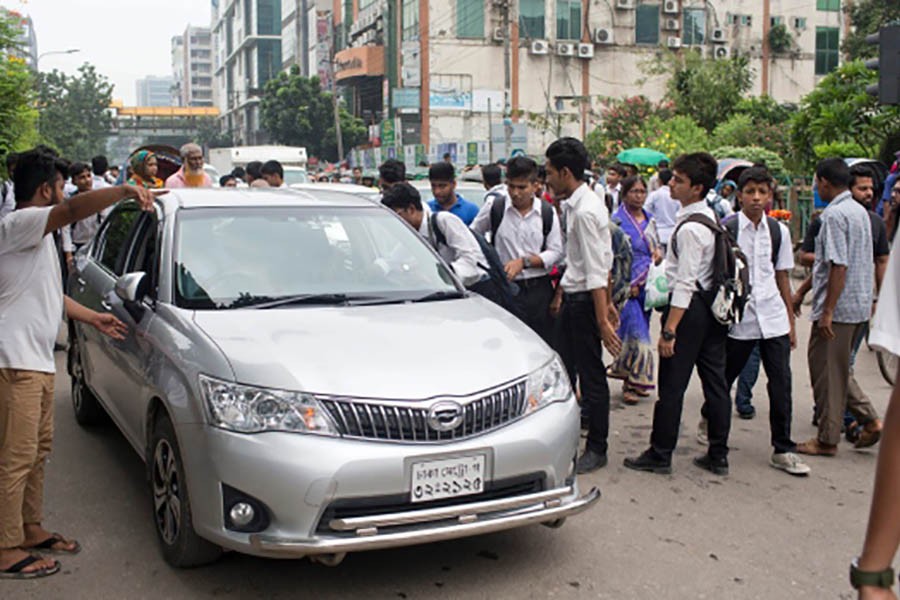The country has been witnessing a 'revolution' of a different kind -one that is spreading like wildfire throughout the country. It is by the students for the people. The 'revolution' relates to the mismanagement in the transport sector that hugely cost lives and livelihoods every year. Since Elias Kanchon, an actor of our film industry who lost his wife in road accident, started safe road campaign a few years back, we thought things would improve but the situation seems to have worsened with a growing number of road accidents. After Tareque Masud, a prominent filmmaker and Ashfaque Munier Mishuk, a media specialist, died in a road accident, we heard a lot of noise and government assured us of safe roads. But all proved lip services. The root of the evil is rampant corruption in the transport sector, allegedly in the BRTA, that controls the driving licence and fitness of vehicles.
In a short story by Leo Tolstoy, there is a wonderful message: children are wiser than their elders. The recent wave of protests across the country by school and college students for a safe road reminds me of that lesson. The teens got into action when two students were brutally killed by reckless bus driving in Dhaka. Tens of thousands of teenagers took to the streets to take control of traffic. It was a protest of a different kind - chanting slogans ran parallel to managing traffic smoothly. Passengers were not blocked nor harassed. They checked documents related to running vehicles, forced drivers to follow the designated lanes. More importantly, they did not take law in their own hands; instead requested the traffic police standing nearby to sue the defaulters.
Presumably, the first lesson that they generated is the fact that a few of the ministers, judges and top police officials do not ride on a right vehicle with proper licence. But this is postulated by the laws of the land that all vehicles must ply on roads with due permits from the road authority. In fact, this is just the tip of the iceberg. Hundreds of vehicles are plying on the road without proper papers. We, the parents were all aware of the misdeeds and management but never ever raised voice loudly. Deaths never came to us as dearly as it came in case of most recent deaths of two students of Ramizuddin college. The second lesson is that discipline in traffic system could easily be enforced provided the traffic police are efficient and honest. Third, fuel to the fire was added by a comment - and the smiling face - from a minister who leads the organisation of transport workers. Students rightly demanded his resignation from the ministry as his positions are of conflicting interests as well as violation of the constitution.
However, it would perhaps be wrong to suggest that killing of two students caused the uproar. In fact it is a cumulative concern overlooked by concerned quarters for decades. The tension was brewing but could never explode. A newspaper report shows that (a) during the last three years or so, 25 thousand people died of road accidents indicating 20 persons killed per day; during the same period, 62 thousand people were reportedly injured; (b) the economic loss from road accidents is estimated to amount Tk 40,000 crores per year- roughly 2-3 per cent of GDP; (c) among the total deaths, reckless driving of drivers account for 37 per cent of deaths and excess speed claim 53 per cent. That means reckless driving and speed contribute to 90 per cent of total deaths by road accidents. We can possibly argue that 90 per cent of the deaths could be avoided if drivers were educated, properly trained, and rules on roads were properly adhered to. ; (d) most of the killed or injured persons comprise babies, young and working-aged groups. This indicates that both economic and political future leadership is lost due to road accidents. The same source also said that five instructions by the Prime Minister in June to provide security to passengers on roads and highways fell on deaf ears.
The rise of the spirit of the common people, after the famous Ganojagoron manch, has been widely acclaimed by the people --irrespective of political affiliations. What parents failed to perform, children overtakes to do. This type of leaderless 'revolution' created mostly by students and youths, after the '52 language movement, is a history in its own right. However, after prolonged protests spanning a week and assurance coming from the government that their nine points demand would be met immediately, students should go back to their classes. We expected that the Prime Minister would address the nation to convey the concerns of her government in this regard. Instead, we have unfortunately saw the the police and party cadres swooped on innocent students agitating on the streets. It must be admitted that, as has been shown by the students, public funded professional fail to do a job that is easily doable - a lesson worth taking by the managers of the state.
A poster on the road that was under siege of the protesters read: "The state is under repair: we regret inconvenience caused'. We urge upon the government to listen to the lessons given by our children as sometimes they are wiser than their parents. We also urge that stern actions be taken against transport workers and owners who keep people hostage by various means. Finally, politicians should refrain from taking advantage of the issue at stake. The movement is not against the present government but against the non-implementation of the existing rules and regulations. Again, it is not carried out by razaakrs or militants but by peaceful protestors of Bangladesh.
Let children remain wiser than parents, at least sometimes.
Abdul Bayes is a former Professor of Economics at Jahangirnagar University


